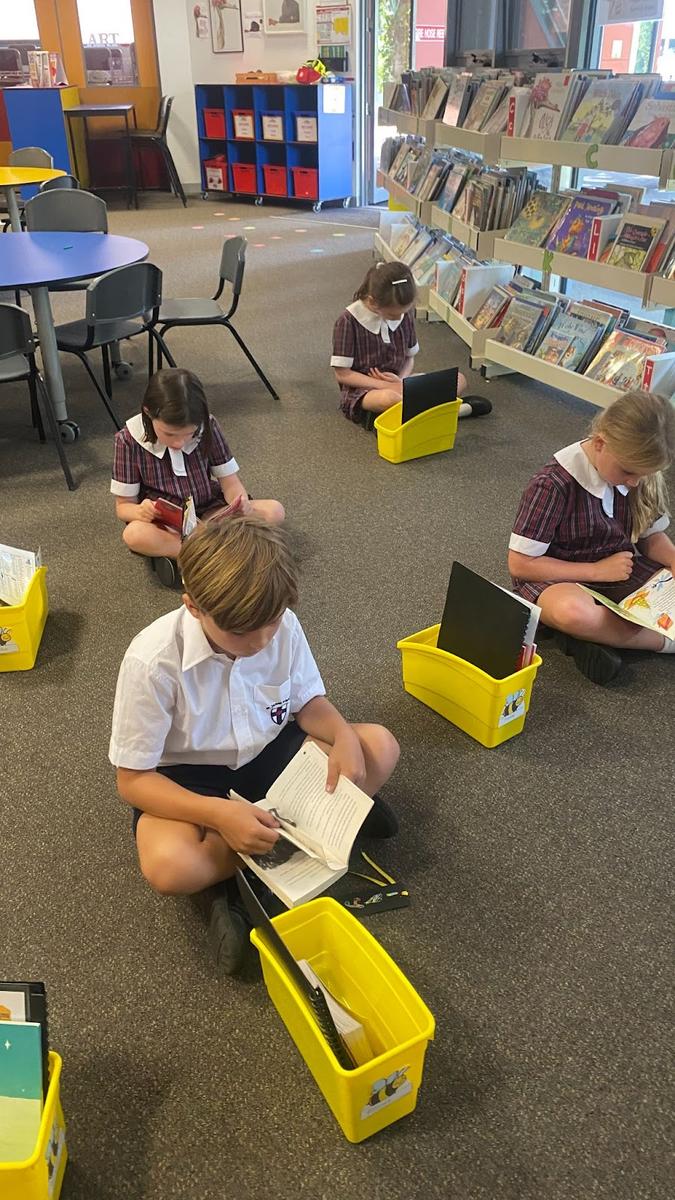Literacy

It’s Week 9 already and Literacy learning at St James is well underway!
Teachers and students have made a positive, happy start to the school year, in their exciting learning spaces. Together, they have been busy setting up routines and expectations to encourage consistent, positive reading and writing behaviors.
In the first 9 weeks of this term, teachers have made understanding student needs a priority so they can target the explicit teaching of Speaking and Listening, Reading and Viewing, Writing, Phonics, Spelling, Grammar and Handwriting.
Even in these early stages of the year, quality differentiated teaching is a cornerstone of best practice at St James. All teachers ensure to adjust learning tasks to enable and support, whilst also extending and challenging. This allows teachers to cater for students at their point of need. Such practice is embedded in our teaching and learning culture and has become a very natural and fundamental aspect of our Literacy programs.
How lucky we are at St James to have passionate, dedicated teachers and motivated and enthusiastic students to teach!
How our students see Literacy so far in 2023…
I love Literacy. My favorite bit is writing. I love that you can write lots and you can make up great stories and add paragraphs.
Atticus K (Year 2)
I really love reading. Some of the stories we read are very interesting and the activities are really fun.
Jessica C (Year 2)
I like reading. When I read hard books, it's fun when you get to sound out words and be challenged. I like to look at the front cover and read the blurb to find out about the book and when I read adventure stories I feel like I'm in the book.
Lila S (Year 2)
I like everything about Literacy. We write a lot and make our own narrative stories. I could read all day. Reading groups are fun.
Mila G (Year 1)
We do writing. We write about our weekend and what we did. We are also writing stories about the Gruffalo. I like reading groups and playing games.
Bailey F (Year 1)
I really like reading because when you read it feels like you are really in the adventure. In writing we are doing persuasive texts andI like arguing my point of view.
Charlie F (Year 3)
I like reading because it's like you are saying the words the author says. I like learning all the digraphs, reading books and playing games.
Dolly B (Year 3)
I love doing spelling tests and designing slogans for Charlie and the Chocolate Factory. I love listening to Miss Taylor read our novel.
Audrey G (Year 4)
I love learning how to read and spelling new words. I love reading most of all. We do lots of reading. I love writing narratives. They are the best.
Poppy H (Year 4)
I like when Miss Slater reads stories and puts the screen on and shows us books.
Ellie P (Prep)
I like it when we make our letter craft and watch stories. I like the songs we sing about letters.
Indigo G (Prep)
We have learned lots of Genres. We are learning about Weary Dunlop and Fred Hollows and reading really interesting Biography to connect some of our literacy to Inquiry.
Jason B (Year 5)
You can express your creativity and use your own imagination and create images about the characters you are reading. In writing you can play with words and use onomatopoeia and make your writing sound more engaging.
Audrey H (Year 5)
I am really enjoying our class text WONDER. It's a relatable and emotional book that engages me. I have really been enjoying learning about adverbs and adjectives in writing and I have been using descriptive language to improve my writing and narrative.
Sophie W (Year 6)
I really enjoy writing creative narratives because it makes us use our imagination and show others our brilliant and different ideas. I also really like literature circles because we can share our different opinions on books and learn from them.
Katie Z (Year 6)
I have really enjoyed the writing task Mr Niarros has put us to because we have learned lots of adjectives and adverbs and now my story sounds a lot better. I have really enjoyed the book we're reading as a class - WONDER as it is really emotional and engaging. We have interesting discussions about it and recap what we have read.
Noah S (Year 6)
Building Reading Stamina
One of the strategies of reading that we focus on across the school at the start of each school year is Building Reading Stamina.
Having stamina for something means being able to stick with something for periods of time. This stamina, or endurance, builds strength. Stamina can apply to lots of different areas, such as exercise or painting. It can also apply to reading. Teachers often think about a student’s reading stamina.
Reading stamina is a child’s ability to focus and read independently for long-ish periods of time without being distracted or without distracting others. Reading stamina is something that parents can help students develop.
Here’s how: 1. Vary the way the reading is done. Parents can think about this in terms of having their child “read to himself, read to someone, and listen to reading.” Some combination of the three should make up the reading time, especially for new or struggling readers.
2. Choose “just right” books. If your child is at a stage of being able to read alone, help him choose books that he is able to read independently. This means he should be able to decode almost every word in the book correctly. In this situation, avoid using books that are too difficult to read alone. If your child will be reading with you, choose books that are lively and engaging.
3. Set reasonable goals. Most toddlers and preschoolers find it difficult to sit for long periods of time, even with the most engaging book! When starting out, limit book time to just a few minutes and work up from there. For elementary aged readers, consider starting with 10-15 minutes of reading time, and work up from there. Add a few minutes to your reading time every week or so.
4. Celebrate progress. Without getting too caught up on the number of minutes spent reading, celebrate the time that is spent reading. Share your favorite parts of books read, plan the next visit to the library, and share progress with other family members. Spending longer periods of time reading means fewer interruptions and more time reading what you love.
As your child moves into higher grades, having reading stamina will help your child navigate the longer texts and assignments. Using these tips can help develop more stamina in your reader.
Antoinette Ferrari and Mandi Joplin
Literacy Leaders


